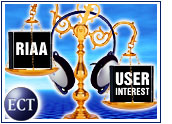
The Recording Industry Association of America (RIAA) has withdrawn its offer ofamnesty to file-sharers. Previously, the group had agreed not to sue individualswho would pledge to stop trading copyrighted music through peer-to-peer (P2P) services and applications.
However, the RIAA also diverged from its standard message of blaming online P2P file-sharing for its dwindling sales figures, instead calling P2P “onefactor” of several that are hurting album sales.
“The decline in young buyers, who are the most active downloaders onpeer-to-peer systems, is another confirmation that illegal downloading isone factor, along with economic conditions and competing forms of entertainment, that is displacing legitimate sales,” RIAA chairman and CEO Mitch Bainwol said.
“That’s a fairly significant change in tune,” Yankee Group senior analystMike Goodman told TechNewsWorld. “They’re being forced into a reactionaryposition, with more and more research coming out showing P2P downloading is not quite the green-eyed monster the RIAA makes it out to be.”
End of Amnesty
In a brief filed in Los Angeles County Superior Court — where the RIAA is being sued over its Clean Slate amnesty program — RIAA attorneys wrote that the amnesty deal is no longer necessary, has been stopped and should not bethe basis of litigation.
“As public awareness about the illegality of unauthorized copying anddistribution of music files over peer-to-peer computing has dramaticallyincreased since the inception of the program, the RIAA has concluded thatthe program is no longer necessary or appropriate,” the brief said.
For her part, however, Electronic Frontier Foundation staff attorney Wendy Seltzer said the program likely ended because the RIAA’s promise of immunity was hollow.
“The problem that the RIAA was forced to recognize was that they couldn’tguarantee they were not creating more liability for the people they weresigning up,” Seltzer told TechNewsWorld, referring to admissions ofcopyright infringement and violations of law by those who signed up for Clean Slate.
Last November, the RIAA reported 156 settlements and 1,000 participants inthe Clean Slate program. In its latest court filing, the group indicateda total of 1,108 individuals had taken the amnesty offer.
Real Amnesty Possible
The EFF’s Seltzer, who referred to the quiet end of the amnesty program as “aslimy way to do it specific to the lawsuit,” said record labels could offer real amnesty through the EFF’s proposed alternative to the RIAA’s legal campaign: a voluntary collective licensing program that would legitimize file-sharing and help pay artists.
Meanwhile, Goodman, who indicated the RIAA probably did not expect to be sued overthe amnesty program, said the vast majority of file-traders likely ignored the offer because the odds of being sued were extremely slim.
P2P Impact Debated
Goodman added that although the amnesty program’s cessation was expected, the RIAA’s decision to blame other factors for declining music sales may be more significant.
“There’s some fairly high-profile stuff that is increasingly contradictoryto the RIAA research and less biased than the RIAA research,” he said, referring to studies and reports that show P2P has a minimal effect on CD sales.
For every report that indicates other forces are at work, corresponding research from the RIAA highlights P2P’s impact. However, RIAA spokesperson Jonathan Lamy told TechNewsWorld that although the group has always said online file-sharing is the main culprit, it also has included other factors.
“We have consistently said we think piracy is the primary, not exclusive,reason for the decline in sales,” Lamy said. “We’ve never said it’s the solepoint; we think piracy is primary, but there are always other factors thatare at play here.”





















































